大学生应该创业吗(中英文)
大学是否要创业作文英文
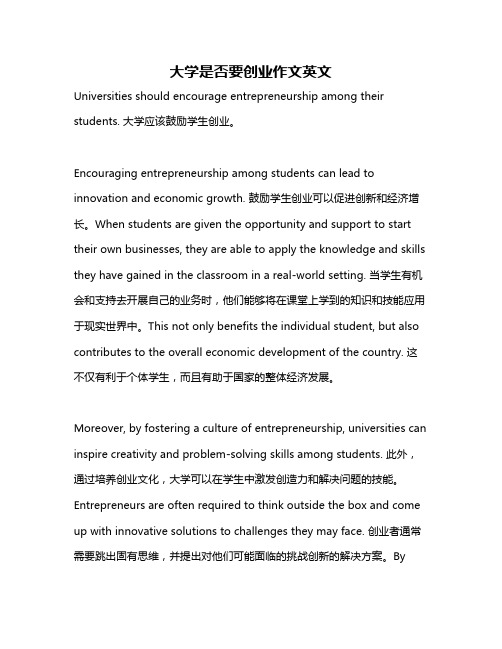
大学是否要创业作文英文Universities should encourage entrepreneurship among their students. 大学应该鼓励学生创业。
Encouraging entrepreneurship among students can lead to innovation and economic growth. 鼓励学生创业可以促进创新和经济增长。
When students are given the opportunity and support to start their own businesses, they are able to apply the knowledge and skills they have gained in the classroom in a real-world setting. 当学生有机会和支持去开展自己的业务时,他们能够将在课堂上学到的知识和技能应用于现实世界中。
This not only benefits the individual student, but also contributes to the overall economic development of the country. 这不仅有利于个体学生,而且有助于国家的整体经济发展。
Moreover, by fostering a culture of entrepreneurship, universities can inspire creativity and problem-solving skills among students. 此外,通过培养创业文化,大学可以在学生中激发创造力和解决问题的技能。
Entrepreneurs are often required to think outside the box and come up with innovative solutions to challenges they may face. 创业者通常需要跳出固有思维,并提出对他们可能面临的挑战创新的解决方案。
大学是否要创业作文英文
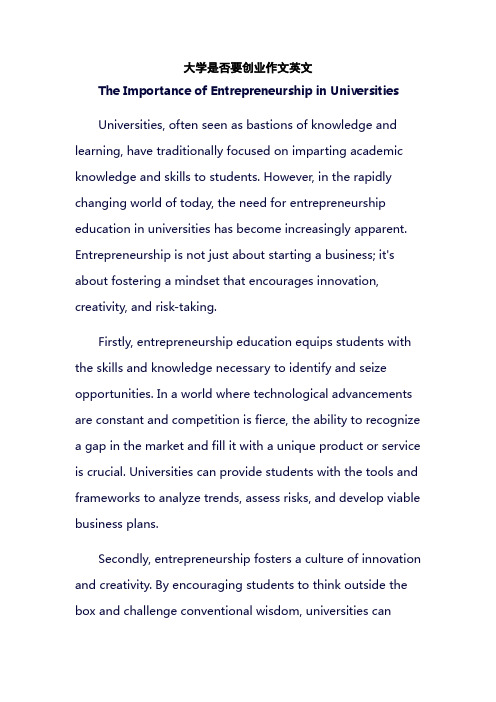
大学是否要创业作文英文The Importance of Entrepreneurship in UniversitiesUniversities, often seen as bastions of knowledge and learning, have traditionally focused on imparting academic knowledge and skills to students. However, in the rapidly changing world of today, the need for entrepreneurship education in universities has become increasingly apparent. Entrepreneurship is not just about starting a business; it's about fostering a mindset that encourages innovation, creativity, and risk-taking.Firstly, entrepreneurship education equips students with the skills and knowledge necessary to identify and seize opportunities. In a world where technological advancements are constant and competition is fierce, the ability to recognize a gap in the market and fill it with a unique product or service is crucial. Universities can provide students with the tools and frameworks to analyze trends, assess risks, and develop viable business plans.Secondly, entrepreneurship fosters a culture of innovation and creativity. By encouraging students to think outside the box and challenge conventional wisdom, universities cannurture a generation of problem-solvers who are not afraid to take risks and pursue their passions. This kind of mindset is not only beneficial for those interested in starting their own businesses but also for those who want to make a difference in any field they choose to enter.Moreover, entrepreneurship education helps students develop a sense of self-reliance and resilience. Starting a business or pursuing an innovative idea often involves overcoming obstacles and setbacks. By learning to navigate these challenges, students gain valuable life skills that will help them succeed not just in their professional lives but also in their personal ones.Finally, universities have a role to play in contributing to economic growth and societal development. By fostering an entrepreneurial culture, universities can produce graduates who are not just job-seekers but also job-creators. These graduates can go on to start their own businesses, generate employment opportunities, and contribute to the overall economic vitality of their communities.In conclusion, entrepreneurship education in universities is essential for preparing students for the challenges andopportunities of the 21st century. It not only equips them with the skills and knowledge necessary to succeed in the business world but also fosters a mindset that encourages innovation, creativity, and risk-taking. By investing in entrepreneurship education, universities can play a pivotal role in shaping a more innovative and entrepreneurial society.。
大学生是否该创业英语作文
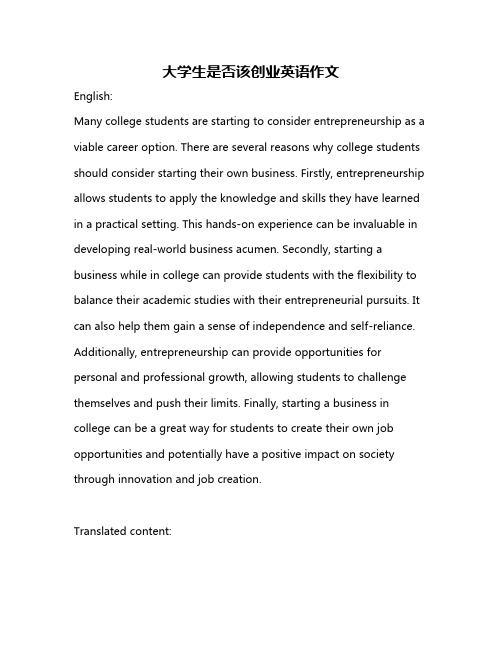
大学生是否该创业英语作文English:Many college students are starting to consider entrepreneurship as a viable career option. There are several reasons why college students should consider starting their own business. Firstly, entrepreneurship allows students to apply the knowledge and skills they have learned in a practical setting. This hands-on experience can be invaluable in developing real-world business acumen. Secondly, starting a business while in college can provide students with the flexibility to balance their academic studies with their entrepreneurial pursuits. It can also help them gain a sense of independence and self-reliance. Additionally, entrepreneurship can provide opportunities for personal and professional growth, allowing students to challenge themselves and push their limits. Finally, starting a business in college can be a great way for students to create their own job opportunities and potentially have a positive impact on society through innovation and job creation.Translated content:许多大学生开始考虑创业作为一种可行的职业选择。
关于大学生应不应该创业的英语作文
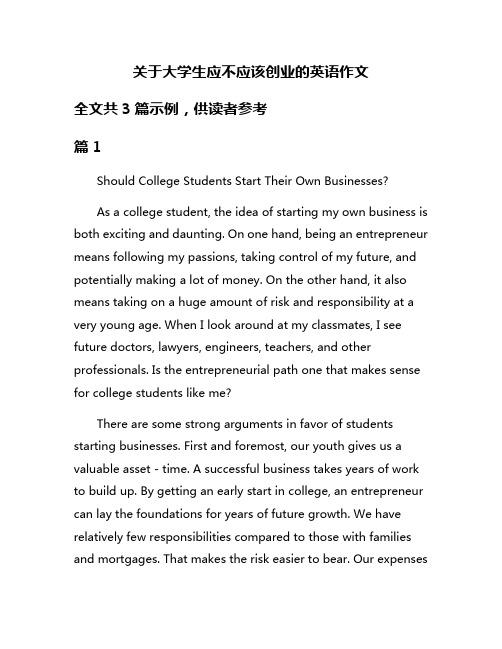
关于大学生应不应该创业的英语作文全文共3篇示例,供读者参考篇1Should College Students Start Their Own Businesses?As a college student, the idea of starting my own business is both exciting and daunting. On one hand, being an entrepreneur means following my passions, taking control of my future, and potentially making a lot of money. On the other hand, it also means taking on a huge amount of risk and responsibility at a very young age. When I look around at my classmates, I see future doctors, lawyers, engineers, teachers, and other professionals. Is the entrepreneurial path one that makes sense for college students like me?There are some strong arguments in favor of students starting businesses. First and foremost, our youth gives us a valuable asset - time. A successful business takes years of work to build up. By getting an early start in college, an entrepreneur can lay the foundations for years of future growth. We have relatively few responsibilities compared to those with families and mortgages. That makes the risk easier to bear. Our expensesare low living in dorms or apartments. And most of us don't yet have spouses or children relying on us financially. So in that sense, we're in a perfect position to take a chance on an unproven business idea.Secondly, the energy and enthusiasm of youth is a plus when taking on a new entrepreneurial venture. We're fearless and brimming with ambition and new ideas. Older entrepreneurs can get set in their ways or become rigid in their thinking. But we college students see the world with fresh eyes. We embrace innovation, take risks, and aren't afraid to challenge conventional thinking. An unencumbered, youthful perspective is a real advantage.Additionally, starting a business as a student gives us incredibly valuable real-world experience. It forces us to develop a multitude of practical skills like budgeting, marketing, sales, operations, people management, and more. We get a head start over our peers in building a professional network. And even if the business ultimately fails, those lessons will still prove useful when we eventually enter the workforce. Experiencing the highs and lows of entrepreneurship first-hand is truly an invaluable education.There are also significant downsides to consider though. Our inexperience and lack of business skills is a huge hurdle. We may be energetic and creative, but we still have so much to learn about actually running a company successfully. Financing a new startup is extremely difficult at any age, but it's especially challenging for students who typically have little money, no credit history, and no track record of success. And since most new businesses fail within a few years, we're risking our future career prospects if we completely forgo things like internships and entry-level jobs in our chosen industry.Furthermore, the extreme stress of starting a company is not for everyone. Juggling classes, homework, extracurriculars, family life, and social lives is hard enough. Adding a brand new business into that mix means taking on an immense workload that could severely impact our studies, mental health, and overall college experience. For every wildly successful student entrepreneur, there are countless others who crashed and burned trying to do too much. Not everyone is prepared for that level of perpetual anxiety and burnout.At the end of the day, I believe there is no universal right or wrong answer. Starting a business in college makes sense for some students but not for others. It depends on our individualskills, interests, financial circumstances, personality traits, and appetite for risk versus reward. Those of us passionate about a specific business idea, comfortable with uncertainty, and motivated by being our own boss, may be well-suited for the startup route. But students simply looking to minimize stress, learn their core academic subjects, and maximize social time may be better off focusing solely on their degrees.My personal view is to at least start small. Rather than diving into launching a official startup, I'm trying some lower-risk ways to get experience like freelancing, running an Etsy shop, doing paid internships at local startups, and participating in business plan competitions. This lets me get my feet wet in entrepreneurship but without risking everything on onemake-or-break venture. Down the road after graduating, if I'm passionate about a specific idea, I'll be in a better position then to pursue it more seriously. But if not, these experiences ensure I'll still gain valuable skills to prepare me for more traditional career paths as well.In the end, an entrepreneurial mindset has value whether you start a company or not. The ability to think creatively, market yourself, adapt to change, and capitalize on opportunities - those entrepreneurial qualities are great assets no matter whatpath we choose after college. So while not everyone may launch the next big tech unicorn as a student, stretching our entrepreneurial muscles in some form during these years enhances our future prospects no matter what we decide to do with our lives and careers. With that said, students considering starting an official business need to carefully weigh the potential rewards against the substantial commitment and sacrifices required to get a new venture off the ground. But for those willing to put in the work, the entrepreneurial path in college can open up many exciting possibilities.篇2Sure, here's an essay on whether or not college students should start their own businesses, written in the style of a student's voice. It's approximately 2,000 words long and in English.Title: The Entrepreneurial Dilemma: Should College Students Pursue Their Business Dreams?College life is a whirlwind of experiences, opportunities, and decisions that shape our future paths. Among the many choices we face is whether to dive headfirst into the entrepreneurial world or stick to the traditional path of academics and eventualemployment. It's a dilemma that has sparked heated debates and divided opinions, with valid arguments on both sides. As a fellow student grappling with this very question, I've spent countless hours weighing the pros and cons, and I'd like to share my thoughts on this complex issue.On one hand, the allure of entrepreneurship is undeniable. The prospect of being your own boss, turning your innovative ideas into reality, and potentially striking it rich is a dream that many of us harbor. After all, who hasn't fantasized about being the next Mark Zuckerberg or Elon Musk, disrupting industries and leaving an indelible mark on the world? The success stories of college dropouts-turned-billionaires like Bill Gates and Steve Jobs only fuel our entrepreneurial aspirations.Moreover, the college experience itself can be an ideal breeding ground for entrepreneurial ventures. With access to a diverse pool of talent, cutting-edge research, and a supportive ecosystem, campuses can provide the perfect incubator for launching startups. Many universities even offer entrepreneurship programs, mentorship, and funding opportunities to encourage student-led businesses. It's an environment ripe with creativity, youthful energy, and awillingness to take risks – qualities that are essential for any successful entrepreneur.However, the path of entrepreneurship is also fraught with challenges and uncertainties. Starting a business from scratch requires an immense amount of time, effort, and financial resources – luxuries that many college students simply don't have. Juggling classes, extracurricular activities, and the demands of running a company can be an overwhelming endeavor, often leading to burnout or compromised academic performance.Furthermore, the statistics on startup success rates are sobering. According to various studies, a staggering 90% of startups fail within the first few years, largely due to a lack of funding, poor market fit, or inexperience in business management. As students, we may have brilliant ideas, but we often lack the real-world experience, industry knowledge, and resilience required to navigate the treacherous waters of entrepreneurship.Even if a student-run business manages to gain traction, there's the question of opportunity cost. By dedicating our prime years to building a company, we may miss out on valuable internships, networking opportunities, and the chance to exploredifferent career paths. These experiences can be crucial for personal and professional development, as well as securing a stable job after graduation.On the flip side, proponents of the traditional academic route argue that a college education provides a solid foundation of knowledge, critical thinking skills, and a well-rounded perspective – assets that are invaluable in any career, including entrepreneurship. By focusing on our studies and gaining relevant work experience through internships or part-time jobs, we can better prepare ourselves for the challenges that lie ahead, whether we eventually choose to start our own businesses or pursue more conventional employment.Personally, I find myself torn between these two paths. As someone with a passion for innovation and a desire to leave my mark on the world, the entrepreneurial route holds a strong appeal. The idea of turning my creative visions into tangible products or services that can positively impact people's lives is exhilarating. At the same time, the risks and uncertainties associated with entrepreneurship give me pause.After much contemplation, I've come to the conclusion that the answer lies in striking a balance. Instead of rushing headlong into entrepreneurship or dismissing it entirely, I believe thewisest approach is to explore and nurture our entrepreneurial inclinations while simultaneously prioritizing our academic pursuits.This can take various forms, such as participating in entrepreneurship clubs or competitions, taking relevant courses, or working on side projects that allow us to develop our business acumen. By doing so, we can gain invaluable experience and test our ideas without compromising our educational goals. If our ventures show promise, we can then decide whether to pursue them full-time after graduation or use the knowledge gained to secure employment and potentially start a business further down the line.Ultimately, the decision to embrace entrepreneurship as a college student is a deeply personal one, influenced by our individual goals, risk tolerance, and passion. However, regardless of the path we choose, it's crucial to approach the decision with a clear understanding of the challenges and opportunities inherent in each option.For those of us who possess the drive, resilience, and unwavering determination to turn our dreams into reality, entrepreneurship can be a rewarding and fulfilling journey. But for those who prefer a more structured and stable path, focusingon academics and gaining relevant work experience can be equally rewarding, opening doors to a wide array of career opportunities.The beauty of our college years lies in the freedom to explore, experiment, and discover our true passions. Whether we choose to dive into entrepreneurship or follow a more conventional route, the experiences and lessons we gain during this formative period will undoubtedly shape our future endeavors and contribute to our personal and professional growth.篇3To Start a Business or Not as a University Student?That is the million dollar question these days. With the rise of entrepreneurship being glorified in the media and successful college dropouts like Mark Zuckerberg and Bill Gates being idolized, more and more students are questioning whether they should put their studies on hold to chase their own startup dreams. On one hand, my peers who have taken the entrepreneurial plunge talk about the incredible freedom, pride of ownership, and skyrocketing potential rewards of starting your own company. But on the other side, my more risk-averseclassmates warn about the dangers of jeopardizing our education and undercutting our future career prospects because of a failed business venture. As a 20-year-old university junior myself, I've given this dilemma a ton of thought.When I imagine being a student entrepreneur, I get pretty excited about the idea. Creating something from scratch and being your own boss definitely has its allures. Instead of struggling through classes that don't always seem relevant and jumping through hoops to impress corporate recruiters, I could be designing my own product or service to actually solve a problem that I'm passionate about. While my friends are pulling all-nighters cramming for finals, I could be grinding away building something real and tangible instead of just muddling through rote assignments. And if my startup starts generating real revenue and profit, I could theoretically bid adieu toentry-level corporate drudgery and be already running my own show by my early 20s rather than having to spend a decade toiling my way up the ranks. No more agonizing over getting the perfect summer internship to boost my resume or stressing about brutal 100-hour weeks at a huge law or consulting firm just to get my foot in the door. Just pure flexibility, autonomy, and fastrap- id career growth if my business takes off.Those upsides are immensely seductive, no doubt. But I also can't ignore those logical nagging doubts in the back of my mind about the astronomical risks involved. Founding a startup company is like taking the world's biggest gamble. The failure rates are absolutely daunting - over 90% of new businesses ultimately go belly up within a few years. And with that failure would come disaster: my college years and tuition dollars flushed down the drain, zero academic credential to fall back on, and a tarnished professional reputation in the eyes of potential future employers who would consider me a dropout risk. By putting all my eggs in the entrepreneurial basket, I would essentially be kissing financial security goodbye for the foreseeable future in exchange for a long-shot chance at hypothetical success that the vast majority of startups never attain. My parents and relatives would probably go into conniptions as well about me squandering my educational opportunities and jeopardizing my future over some youthful pipe dream.So those are the clashing perspectives that have been battling it out in my mind recently. Part of me is extremely tempted by the motivational startup success stories and portrayal of entrepreneurs as bold visionaries and rhetic company-building rockstars. But the realist in me keeps gettinghung up on the extreme difficulty of actually pulling that off and the safety net that a college degree provides. At least with an education under my belt, I would have a respectable fallback option and established credentials to join the job market if my business bombed, whereas dropping out with no qualifications would be apocalyptically risky.Ultimately, after much agonizing about this quandary, I think I've settled on a balanced perspective and gameplan. I absolutely want to keep an open mind towards entrepreneurship and take steps during college to nurture those inclinations and gain exposure to the startup world. Things like taking business classes, joining entrepreneurship clubs, entering pitch competitions, and maybe even building out a prototype or minimum viable product for one of my business ideas seem invaluable. That way I'm at least developing some of the mindset and skills to potentially take that route someday. But I'm fairly certain that I don't want to actually take the radical step of dropping out of school entirely or shelving my studies to go all-in on a startup idea before graduation.To me, the smartest approach is to gain that entrepreneurial training while still completing my bachelor's degree as a form of insurance. That credential will serve as a safety net - if my startupdreams don't pan out, I'll be able to get hired at a normal company without having prematurely tanked my career prospects. And in the meantime, I'll be better positioned to attract investors, partners, or acquirers if I do launch a promising business because I'll be seen as less of a risk. At age 22 with a diploma in hand and maybe even an MVP to shop around, my entrepreneurial ambitions will come across as far less flakey and ungrounded since I'll have proven academic discipline under my belt.So in summary, I believe the ideal path is to keep an open mind and actively work on sharpening my entrepreneurial skillset and exploring opportunities while still being pragmatic enough to not put my entire future at stake without a Plan B. Surround myself with other entrepreneurially-minded people, keep generating and validating business ideas, and build up my experiences and resume with an eye towards potentially striking out on my own someday. But hold off on actually abandoning my studies or starting a company until I have that degree in my back pocket. With an intelligent blend of pragmatism and boldness, I believe I can get the best of both worlds - playing it safe while still dreaming big and working diligently to make those dreams a reality someday. It's all about balancingresponsibilities and risks in the short-term to maximize opportunities in the long run.。
大学生要敢于创业的英语作文
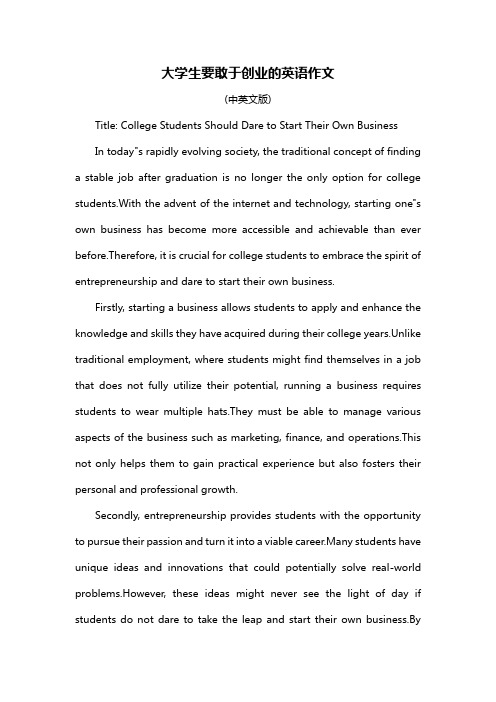
大学生要敢于创业的英语作文(中英文版)Title: College Students Should Dare to Start Their Own BusinessIn today"s rapidly evolving society, the traditional concept of finding a stable job after graduation is no longer the only option for college students.With the advent of the internet and technology, starting one"s own business has become more accessible and achievable than ever before.Therefore, it is crucial for college students to embrace the spirit of entrepreneurship and dare to start their own business.Firstly, starting a business allows students to apply and enhance the knowledge and skills they have acquired during their college years.Unlike traditional employment, where students might find themselves in a job that does not fully utilize their potential, running a business requires students to wear multiple hats.They must be able to manage various aspects of the business such as marketing, finance, and operations.This not only helps them to gain practical experience but also fosters their personal and professional growth.Secondly, entrepreneurship provides students with the opportunity to pursue their passion and turn it into a viable career.Many students have unique ideas and innovations that could potentially solve real-world problems.However, these ideas might never see the light of day if students do not dare to take the leap and start their own business.Bydoing so, they not only have the chance to make a difference in the world but also create job opportunities for others, thereby contributing to the economy.Lastly, starting a business early in life can lead to greater success in the long run.Failure is an inevitable part of the entrepreneurial journey, but it is also a valuable teacher.By starting young, students have more time to recover from setbacks, learn from their mistakes, and iterate their business models.This iterative process can help them to refine their strategies and increase their chances of success in the future.In conclusion, the era of entrepreneurship has arrived, and college students should seize the day and embrace the spirit of entrepreneurship.By starting their own business, they can apply their knowledge, pursue their passion, and lay a solid foundation for future success.Aspiring entrepreneurs should not be deterred by the risks and challenges involved, as the potential rewards are immeasurable.So, let us boldly step into the world of entrepreneurship and create a brighter future for ourselves and for generations to come.。
关于大学生应不应该创业的英语作文
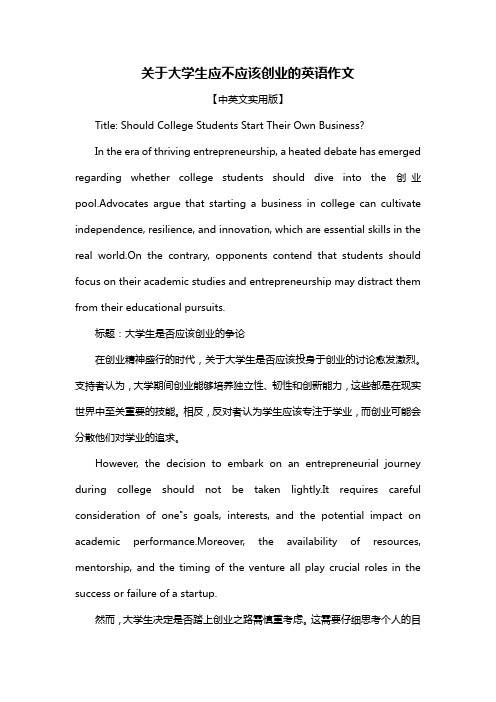
关于大学生应不应该创业的英语作文【中英文实用版】Title: Should College Students Start Their Own Business?In the era of thriving entrepreneurship, a heated debate has emerged regarding whether college students should dive into the创业pool.Advocates argue that starting a business in college can cultivate independence, resilience, and innovation, which are essential skills in the real world.On the contrary, opponents contend that students should focus on their academic studies and entrepreneurship may distract them from their educational pursuits.标题:大学生是否应该创业的争论在创业精神盛行的时代,关于大学生是否应该投身于创业的讨论愈发激烈。
支持者认为,大学期间创业能够培养独立性、韧性和创新能力,这些都是在现实世界中至关重要的技能。
相反,反对者认为学生应该专注于学业,而创业可能会分散他们对学业的追求。
However, the decision to embark on an entrepreneurial journey during college should not be taken lightly.It requires careful consideration of one"s goals, interests, and the potential impact on academic performance.Moreover, the availability of resources, mentorship, and the timing of the venture all play crucial roles in the success or failure of a startup.然而,大学生决定是否踏上创业之路需慎重考虑。
关于大学生应不应该创业的英语作文
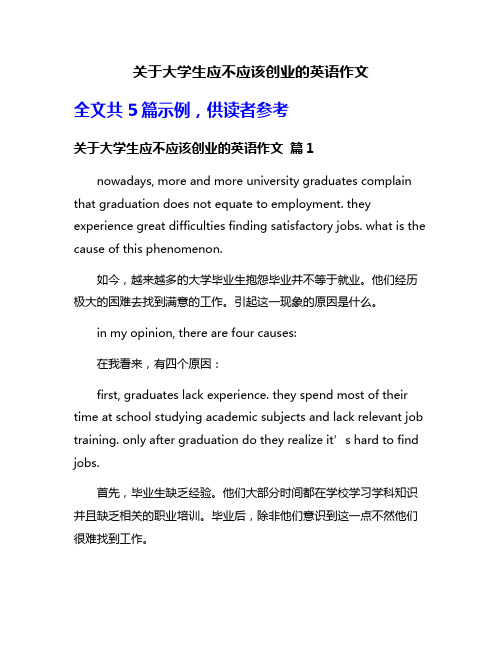
关于大学生应不应该创业的英语作文全文共5篇示例,供读者参考关于大学生应不应该创业的英语作文篇1nowadays, more and more university graduates complain that graduation does not equate to employment. they experience great difficulties finding satisfactory jobs. what is the cause of this phenomenon.如今,越来越多的大学毕业生抱怨毕业并不等于就业。
他们经历极大的困难去找到满意的工作。
引起这一现象的原因是什么。
in my opinion, there are four causes:在我看来,有四个原因:first, graduates lack experience. they spend most of their time at school studying academic subjects and lack relevant job training. only after graduation do they realize it’s hard to find jobs.首先,毕业生缺乏经验。
他们大部分时间都在学校学习学科知识并且缺乏相关的职业培训。
毕业后,除非他们意识到这一点不然他们很难找到工作。
second, competition among graduates grows more bitter and more bitter and bitter. the supply of university graduates exceeds social demand. this results in a decreased chance for any individual graduate to find a job.第二,毕业生之间的竞争日趋激烈。
大学英语作文:大学生应该创业吗?
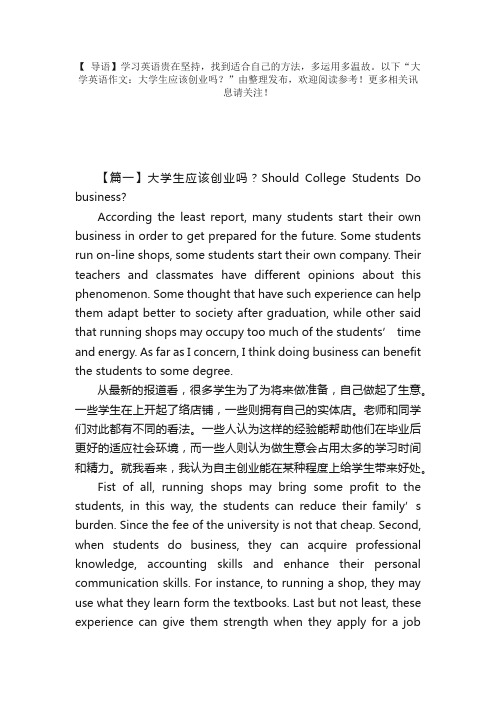
【导语】学习英语贵在坚持,找到适合自己的方法,多运用多温故。
以下“大学英语作文:大学生应该创业吗?”由整理发布,欢迎阅读参考!更多相关讯息请关注!【篇一】大学生应该创业吗?Should College Students Do business?According the least report, many students start their own business in order to get prepared for the future. Some students run on-line shops, some students start their own company. Their teachers and classmates have different opinions about this phenomenon. Some thought that have such experience can help them adapt better to society after graduation, while other said that running shops may occupy too much of the students’ time and energy. As far as I concern, I think doing business can benefit the students to some degree.从最新的报道看,很多学生为了为将来做准备,自己做起了生意。
一些学生在上开起了络店铺,一些则拥有自己的实体店。
老师和同学们对此都有不同的看法。
一些人认为这样的经验能帮助他们在毕业后更好的适应社会环境,而一些人则认为做生意会占用太多的学习时间和精力。
就我看来,我认为自主创业能在某种程度上给学生带来好处。
Fist of all, running shops may bring some profit to the students, in this way, the students can reduce their family’s burden. Since the fee of the university is not that cheap. Second, when students do business, they can acquire professional knowledge, accounting skills and enhance their personal communication skills. For instance, to running a shop, they may use what they learn form the textbooks. Last but not least, these experience can give them strength when they apply for a jobbecause they have related experience. By doing business with others, they can learn how to cooperate with others and become more competitive in the job market.首先,经营店铺可以为学生带来利润。
- 1、下载文档前请自行甄别文档内容的完整性,平台不提供额外的编辑、内容补充、找答案等附加服务。
- 2、"仅部分预览"的文档,不可在线预览部分如存在完整性等问题,可反馈申请退款(可完整预览的文档不适用该条件!)。
- 3、如文档侵犯您的权益,请联系客服反馈,我们会尽快为您处理(人工客服工作时间:9:00-18:30)。
大学生应该创业吗(中英文) According the least report, many students start their own business in order to get prepared for the future. Some students run on-line shops, some students start their own company. Their teachers and classmates have different opinions about this phenomenon. Some thought that have such experience can help them adapt better to society after graduation, while other said that running shops may occupy too much of the students’ time and energy. As far as I concern, I think doing business can benefit the students to some degree.
从最新的报道看,很多学生为了为将来做准备,自己做起了生意。
一些学生在网上开起了网络店铺,一些则拥有自己的实体店。
老师和同学们对此都有不同的看法。
一些人认为这样的经验能帮助他们在毕业后更好的适应社会环境,而一些人则认为做生意会占用太多的学习时间和精力。
就我看来,我认为自主创业能在某种程度上给学生带来好处。
大学生应该创业吗?Should College Students Do business?
Fist of all, running shops may bring some profit to the students, in this way, the students can reduce their family’s burden. Since the fee of the university is not that cheap. Second, when students do business, they can acquire professional knowledge, accounting skills and enhance their personal communication skills. For instance, to running a shop, they may use what they learn form the textbooks. Last but not least, these
experience can give them strength when they apply for a job because they have related experience. By doing business with others, they can learn how to cooperate with others and become more competitive in the job market.
首先,经营店铺可以为学生带来利润。
在这种情况下,学生能减轻家庭负担。
大学的学费可不算便宜。
其二,当学生们创业时,他们能够掌握专业的知识,计数能力,提高个人的交际能力。
例如说,经营一家店铺时,他们能够把在课本中学到的东西用到实际中去。
最后,创业的经验能在他们找工作时带来优势。
通过与他们做生意,他们知道该如何与他人合作,在人才市场更具竞争力。
To sum up, I think students should do business if they have the chance. It’s a good way to enhance personal abilities. I believe the advantages far outweigh the disadvantages.
总的来说,我认为,如果有机会的话,学生应该尝试去创业。
这是个提高个人能力的好方法,这其中,利大于弊。
